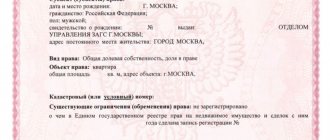Last modified: January 2021
Almost everywhere, the gratuitous transfer of ownership of real estate through a deed of gift is widespread. If all aspects of proper registration are followed, it is possible to complete the transaction in a very short time. When receiving ownership rights, the new owner is asked a number of pressing questions: “Does he have full rights to the property?”; “Is it possible to donate a donated apartment if necessary?” and “Is the ability to re-gift limited to any number, is there a numerical limit to such transactions?”
Most often, close relatives resort to this type of legal action in order to avoid paying income taxes. But it is not uncommon for there to be cases of transfer of ownership rights by deed of gift to an outsider. Of course, in this case, you will have to pay a significant tax, but this method may allow, for example, to transfer without the permission required for the sale of other home owners, in case of shared ownership of real estate.
Legal subtleties of donating a gift
There are some nuances in completing a transaction with a gift, the object of which went to the current owner of the property also under a deed of gift. You should pay attention to them if you want to donate living space again.
The main condition is that before donating an apartment, the new owner must acquire full rights to it - that is, register the property in the specialized service of Rosreestr or in the multifunctional center (MFC). Subsequently, this will give the advantage that even if the property is encumbered by the fact that the first owner lives on it, the new full owner can dispose of the property at his own discretion (Article 209 of the Civil Code of the Russian Federation)
Typically, the procedure for registering a deed of gift takes a short amount of time, especially if you contact a notary office. The exception is situations with special conditions clearly stated in the form of the gift agreement, under which the new owner can take possession only in connection with their occurrence. This category includes requirements when the new owner must enter into a legal marriage, produce an heir, receive an education, etc.
Is it possible to return to the donor?
Sometimes it may be necessary to return a donated apartment or house back. And here the law establishes absolutely no restrictions. Any piece of real estate can be donated, and when choosing a candidate, it can be the person who originally donated this apartment to the current owner. That is, a person can give the gift back at any time.
However, here you should take into account the fact that if you are not close relatives of each other, then you will have to pay the established taxes that are provided by law in relation to the transfer of real estate as a gift.
Reverse action when registering a deed of gift
There are no restrictions or prohibitions on who can act as parties to the transaction. The main thing is that the current legislation is not violated, and the transaction is not feigned and imaginary. The degree of adequacy of the parties to the gift agreement is important.
If the case so requires, it is sometimes necessary to confirm capacity. Therefore, persons who act once as a donor and a recipient can change roles when donating an object again. So in practice it happens that the property becomes the property of the donor back. There are no special restrictions in this regard.
An advantage when re-transferring property back to the donor is a transaction involving a gift to a close relative: spouse, child, parent, sister or brother, when they are exempt from paying the 13% tax (Clause 18.1, Article 217 of the Tax Code of the Russian Federation). Otherwise, you will have to pay tax twice: on the first and subsequent donations.
Features of the apartment transfer transaction
A donation is a gratuitous transaction, where one party is ready to voluntarily and disinterestedly transfer property, and the other is ready to accept or refuse it. Based on the conclusion of the contract, state registration of the transfer of ownership of the apartment to the second person is mandatory. Only then does he have the right to dispose of the object at his own discretion, i.e. rent, sell or donate.
The legislation provides the person who received the gift and registered the apartment with the right of ownership to carry out any legal actions with it in the future. Therefore, answering the question about the legality of the transfer procedure, we can say unequivocally that it is legally possible.
The procedure follows the general rules of donation. It can be completed after the ownership right is registered in Rosreestr for the donee. But an important point is still the need to notify the original owner (first donor) of the intention to transfer the object to another person, because in some cases the donor retains the right to cancel the deed of gift.
The donor has three years to cancel the deed of gift. This procedure is not simple; it is carried out during judicial proceedings. The plaintiff will need to convincingly prove to the court that the transaction was made as a result of fraudulent actions on the part of the donee or under pressure, threats to the life and health of the donor or his family.
The transaction of transferring back to the donor with his consent is also legal.
How to re-donate
If the party who previously received their apartment as a gift wishes to transfer its ownership to another person, then this can be done by performing the following steps:
- Check the actual ownership of the property.
- Obtain consent from the proposed donee to receive the property as a gift.
- Write out everyone registered from the donation object.
- Pay if there are debts and document their absence.
- Collect the necessary documents, draw up an agreement signed by the parties: the donor and the recipient.
- Pay the state fee.
- Submit a package of documents with an application and a donation agreement to Rosreestr or a branch of the MFC. Or simplify the procedure by contacting a notary office for help.
Download the Donation Agreement. Sample (18.5 KiB, 2,985 hits)
Donation agreement for a residential building (22.3 KiB, 341 hits)
Obstacle to the transaction
The donation procedure is quite simple; the ability to carry it out without the obligatory assistance of a notary makes it possible to save money and resolve the issue yourself. We must not forget that there is always the possibility of an artificial delay in the transaction, or even the impossibility of completing it.
The negative aspects that prevent you from donating an apartment, including the following, include:
- Poorly drawn up gift agreement. The consequence may be a refusal in future registration of property with the need to correct shortcomings.
- The need to pay state fees and expenses when applying to a notary.
- Obligation to pay 13% tax for participants not closely related.
If a beneficiary, even a close relative, decides to sell an apartment owned for less than 3 years, the value of which exceeds 1 million, then he is obligated to pay a tax of 13% on the sale.
Spouse's consent to the transaction
With an initial donation and a repeated donation, different requirements arise regarding the need for the consent of the legal spouses.
Download your spouse's consent to donate an apartment. Sample (17.1 KiB, 539 hits)
When real estate is donated for the first time and is jointly owned by both spouses, a written notarized permission for its subsequent donation is required. In addition to other specific features on the ownership of property by each of the spouses, which may be provided for in a previously drawn up marriage contract.
The fact that one of the parties is married does not in any way affect the re-donation. Even when the new owner was related by marital ties at the time of receipt of the property, if it is intended solely for one person’s possession and use. This feature is useful in that it can protect the owner of the apartment during a divorce (Clause 1 of Article 36 of the RF IC).
Multiple recipients
If the question arises: “Is it possible to issue a deed of gift for two people?” Then the answer will be positive. In addition, the number of recipients may be more. For such cases, there are multilateral agreements under which there are either several donees and more than one donor (Article 420 of the Civil Code of the Russian Federation).
How to cancel a deed of gift for a house or apartment
As mentioned above, there are 2 ways to cancel a transaction - at the request of the parties and when filing a statement of claim in the district court. In the first case, the parties need to draw up an appropriate agreement to terminate the contract.
If the property has not yet been transferred to the donee, he has the right to draw up a written application to renounce the residential premises. Let us remind you that the document must be certified by a notary if the deed of gift was certified in a similar way.
If a peaceful resolution of the situation is impossible, file a claim. The contents of the document depend on the grounds for cancellation of the transaction.
The claim is drawn up in simple written form and submitted to the district court at the location of the defendant (in some cases, documents can be sent to the place of registration of the plaintiff).
Contents of the statement of claim
The recipient may file a claim in court if he considers the termination of the gift agreement to be illegal and groundless. In addition, the donor has the right to file a claim if he has legal grounds to appeal to the state authority.
The third category of persons who have the right to demand the return of a donated apartment are citizens whose rights were violated by this transaction (for example, during the alienation of housing that is the joint property of a husband and wife, without obtaining the consent of the second spouse).
The main points that the claim must contain:
- document's name;
- date and city of compilation;
- the name of the district court that will hear the case;
- personal information of the participants in the process (defendant, plaintiff, third parties);
- reasons for going to court;
- plaintiff's claims;
- arguing the legal position of the applicant;
- a list of documents that will supplement this claim;
- applicant's signature.
The statement of claim must be accompanied by documents that can confirm the rightness of the plaintiff and the validity of his claims. If you have other significant evidence (video recordings, witness statements), they are also included in the claim.
Documentation can be transferred to the district court either by the plaintiff himself or by his legal representative. In the latter case, the government agency employee will require identification and a valid power of attorney.
Nuances
Civil law requires compliance with certain rules:
- if the recipient is incapacitated or has not reached the age of majority, his interests are represented by a guardian or trustee, who must provide written consent to the transaction;
- when drawing up an agreement by an authorized person, his powers must be certified by a notarized power of attorney;
- when donating part of an apartment, a notarized consent of other property owners will be required;
- if the recipient already owns part of the apartment, the consent of other owners to the transaction is not required;
- when concluding a transaction in simple written form, each of the parties involved must have the originals of the agreement;
- The gift agreement is not subject to challenge unless fraud by one of the parties is proven.
Donating an apartment received under a gift agreement is not prohibited by law. The transfer of housing occurs in the same way as donation. There are no differences.
Notarization
Notarization of the transaction is an optional, but desirable condition. The presence of a specialist during the registration process helps to avoid many problems. The first advantage of such participation is the legal literacy of the document; there will be no difficulties when registering the object.
The second point is confirmation of the legal purity of the transaction. It is difficult to challenge documents certified by a notary, citing the donor’s inadequacy or non-compliance with the rules of donation. For the court and other authorities, it is obvious that the procedure was carried out according to the law, therefore, there are no grounds for recognizing the transaction as invalid.
Transactions between close relatives are not subject to gift tax.
Is it possible to challenge the decision?
What to do if the apartment to which you had every right became the property of a complete stranger? For example, if a father gave an apartment to his friend. Is it worth doing something in such a case?
If the deed of gift was drawn up in accordance with all the requirements, then such a transaction will be very difficult to challenge. In addition, if the owner donated the property based on personal sympathy (there was no pressure or illegal actions on the part of the recipient), then the decision will be considered legal and it will be impossible to challenge it.
What to do if a transaction is illegal and what cases are considered such ? (Article 168):
- If the recipient of the property could be the owner of information and ignorance or disagreement with the transaction of other owners of this property. In other words, the donee knew that the other owners were not aware of the transaction. This is considered illegal, since the other owners could not influence the process.
- The donor did not actually have the right to dispose of the property. This situation may arise if there were violations or non-compliance with established rules in the preliminary purchase and sale transactions.
- There are cases when jointly acquired property is involved in such manipulations in one way or another. In this case, the consent of both spouses is required. If this condition is not met, then such a transaction can be considered illegal.
This kind of thing is often resolved through court . It is very important to collect evidence of the illegality of the transaction, otherwise it will be almost impossible to achieve a result. The most difficult thing is to prove ignorance of any of the parties .
The preparation of documents must be approached with special attention; a neglectful attitude can lead to fatal errors. They may be the reason for the refusal to conclude a deal. The optimal solution would be to contact legal specialists .
Taxes and costs
In accordance with Art. 333.24 of the Tax Code of the Russian Federation, the cost of notary services for certification of a transaction is 500 rubles. If the donee is not a close relative of the donor, he will have to pay income tax and submit a 3-NDFL declaration to the Federal Tax Service. What is the applicable rate here:
- For citizens of the Russian Federation – 13% of the market value of real estate;
- For foreigners – 30%.
Only parents, grandparents, children, spouses and grandchildren of donors do not pay personal income tax.
Let's look at a specific example of the features of tax calculation:
Citizen Ivankov S.F. received an apartment worth 3,000,000 rubles as a gift from my friend. He is a citizen of the Russian Federation, so he will have to pay 13%. 3,000,000 x 13% = 390,000 rub. – total amount to be paid.
If the region has legislation containing rules for easing or exempting certain categories of citizens from taxation, they must be applied. This usually includes disabled people of groups 1 and 2, large families or parents raising children alone if they are officially considered low-income.
In what cases can you get a refusal?
There are several main points in which an apartment cannot become the property of the gifted person (according to Article 175 of the Civil Code of the Russian Federation):
- If the recipients are employees and employees of various organizations within whose walls the donor was raised or received treatment. In addition, such a transaction may be considered illegal if the housing was donated as payment for services provided.
- In the case where the guardian of a minor child tries to sell the apartment on his behalf.
If such actions are detected and declared illegal, the transaction is considered invalid. Then the property returns to its rightful owner, and the incident can be considered over.
In addition, the deed of gift can be considered invalid if certain errors or liberties were made when preparing the papers:
- Additional points. For example, if as a condition, the donor specifies that the property will pass to the new owner only upon the death of the previous owner.
- If, as a new clause, a condition is set on the lifelong residence of the donor himself in the transferred area.
- In the case where the donor prescribes the need for his lifelong maintenance by the gifted (financially).
If additional clauses not provided for by law are discovered, the contract is canceled. In such situations, the help of a professional and contacting specialized authorities is necessary.
Registration in Rosreestr
So, the acquisition of an apartment by the recipient takes place after entering data about him into the Rosreestr. In this case, he acquires the right to dispose of the object, including its donation, inheritance, and sale. A one-year period is allotted for re-registration.
Documents that will be required when applying:
- Statement by the applicant in which he agrees to the transaction.
- A receipt confirming that the state duty has been paid.
- Papers for the apartment:
- cadastral extracts;
- title papers.
- Passports of the parties to the transaction.
- Certificate of family composition.
Authorized bodies are given no more than 10 days to process the application. If all requirements are met, data about the new owner is entered into Rosreestr. If there are not enough documents, the applicant is given time to collect them.
Registration of a new owner requires the participation of all parties to the transaction. If a citizen cannot appear in person, they can act through a proxy. To participate in the process, the representative will need a notarized power of attorney.
If the donor dies before the information about the new owner is entered into the state register, the apartment is inherited on a general basis: by will/by law. Real estate rental and sale is allowed only after registration with Rosreestr.







